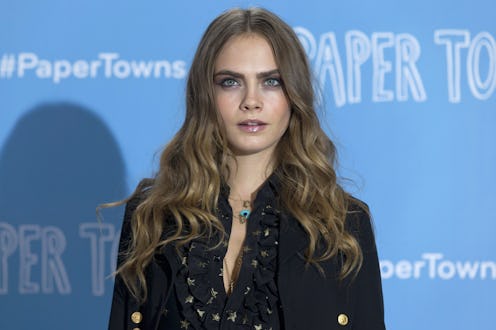Fashion
People Are Not Happy With 'Vogue's Cara D Cover
Cara Delevingne has officially quit modeling, but the newly minted actress still landed her first ever solo Vogue cover this month and majorly opened up in the interview inside. It turns out, however, that readers are not so pleased with the magazine's coverage: The Cara Delevingne Vogue story has sparked a petition that's already been signed by over 12,000 people asking Vogue to apologize for their profile of Delevingne.
Wondering what could possibly be so inflammatory about this interview that it would cause so much anger and inspire so many people to speak out against it? The answer is the insensitive, and frankly backwards, manner with which Vogue and Delevingne's interviewer, Rob Haskell, discuss the actress's sexuality and preference towards women. The LGBTQ community is rightfully particularly incensed over the following passage:
Cara says she felt confused by her sexuality as a child, and the possibility of being gay frightened her. 'It took me a long time to accept the idea, until I first fell in love with a girl at 20 and recognized that I had to accept it,' she explains. 'But I have erotic dreams only about men. I had one two nights ago where I went up to a guy in the back of a VW minivan, with a bunch of his friends around him, and pretty much jumped him.' Her parents seem to think girls are just a phase for Cara, and they may be correct. 'Women are what completely inspire me, and they have also been my downfall. I have only been hurt by women, my mother first of all.'
'The thing is,' she continues, 'if I ever found a guy I could fall in love with, I’d want to marry him and have his children. And that scares me to death because I think I’m a whole bunch of crazy, and I always worry that a guy will walk away once he really, truly knows me.' When I suggest to Cara that to trust a man, she might have to revise an old and stubborn idea of hers—that women are perennially troubled and therefore only women will accept her—her smile says she concedes the point.
The LGBTQ community has appropriately expressed their outrage over the suggestion that Delevingne's sexual preference is not only a passing dalliance, but actually rooted in childhood trauma and a bad relationship with her mother. These are the types of baseless stereotypes that the queer community has had to tirelessly fight against, and to see them perpetuated in such a huge and influential magazine as Vogue is thoroughly disheartening. This passage inspired Julie Rodriguez to start a petition on Care2 asking the magazine to apologize for their poor choice of words, and she's already received over 12,000 signatures of support. Delevingne has yet to speak out on the matter, but as a proud bisexual woman, I can't imagine she would be pleased about the way Vogue has framed her.
Fashionista reports that a Vogue repdeclined their request for comment. Bustle has also reached out to Vogue for comment, and will update this post if they respond.
